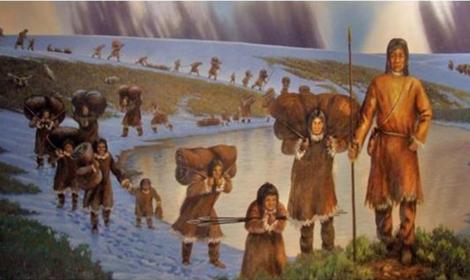为什么白人历史学家说哥伦布发现了美洲?他怎么能发现一片有其他人居住的土地
正文翻译

图。

图。
评论翻译
Michael Alafarm
I discovered this great little restaurant the other day. I told all my friends about it.
As I was the discoverer of this restaurant, I guess I was the only person to have ever eaten there. I guess it was just sitting there with no customers, waiting to be discovered.
Oh…isn’t that what “discover” means—being the first person ever? No? I see…it means to dis-cover, that is, take the cover off—make visible.
Before Columbus, the Americas were widely unknown to the European people. The lands’ existence was covered by a formidable ocean expanse. Columbus took the cover off, and the European’s could now see that they were there.
Sure, this telling is historically Eurocentric. But that’s the point. It’s a history of how the Europeans came to know about the Americas. When white (and other) historians tell the history of pre-Columbian peoples, they talk about how some migrants from northeastern Asia discovered the Americas by crossing a land bridge into what is now called Alaska (at least that’s the dominant theory).
前几天发现了一家很棒的小餐馆,然后我告诉了我所有的朋友。作为这家餐馆的发现者,我猜我是唯一一个曾经在那里用餐的人。我猜它就是坐在那里没有客人,等待被发现。哦...难道这就是“发现”的意思吗?成为第一个知道的人?不是吗?我明白了...它的意思是解开覆盖物,也就是使其显现出来。在哥伦布之前,美洲对欧洲人来说是未知的。这片大陆的存在被广阔的海洋所掩盖。哥伦布揭开了这层遮掩,使欧洲人能够看到它们的存在。当然,这个故事在历史上是以欧洲人为中心的。但这正是重点所在。这是欧洲人了解美洲的历史。当白人(和其他族群)的历史学家讲述哥伦布之前的美洲人历史时,他们会谈论一些来自东北亚的移民是如何穿过一座陆桥进入现在的阿拉斯加发现美洲的(至少这是主流理论)。
Grater Deddly
Some of the answers have gotten this right, but to emphasize another aspect, the indigenous population of the Americas were just as ignorant of the other continents as Europeans and Africans and Asians were of them. Christopher Columbus was the first, through dogged pursuit of his mission to sail west, that succeeded in changing the way people on both the Eastern continents and Western continents saw the world. That is one of the most important discoveries in history. Every person in both hemispheres of the globe would be effected by the ramifications of this new information that Columbus discovered.
其中一些回答已经很正确,但是为了强调另一个方面,美洲土著人口对其他大陆的了解程度与欧洲人、非洲人和亚洲人对他们的了解程度一样有限。克里斯托弗·哥伦布通过坚持不懈地向西航行的使命,成为第一个成功改变东西方人们对世界看法的人。这是历史上最重要的发现之一。全球两个半球的每个人都会受到哥伦布发现的这个新信息的影响。
The universities in the west have been on a masochistic tear since the 1960s, with many if not most being taken over by academics who now view “‘Eurocentrism” as some kind of infection that must be eradicated. The problem is that this that history itself as an academic discipline was created by western institutions, and it ends up being a snake eating its own tale. Even attempts to understand and study lands to the east of Europe have been excoriated as “Orientalism” — as if the word “orient” is a slur of some kind. That inanity is the legacy of Edward Said, who was more a culture critic than anything else, and not surprisingly made his name criticizing Western Civilization.
自20世纪60年代以来,西方的大学一直在进行 masochistic(自虐)的探索,许多大学,如果不是大多数大学,现在都被学者接管,这些学者现在将“欧洲中心主义”视为一种必须根除的感染。问题在于历史学本身作为一门学科是由西方机构创立的,结果成为了一条蛇咬自己尾巴的局面。甚至对欧洲以东的土地进行理解和研究的尝试也被指责为“东方主义”——好像“东方”这个词是一种侮辱。这种愚蠢是爱德华·萨义德(Edward Said)的遗产,他更多地是文化评论家,毫不奇怪地以批评西方文明而闻名。
This is the context as to why something so obvious as Christopher Columbus discovering the New World can be dismissed as being much ado about nothing. It changed the world, it changed how people viewed the world, figuratively and literally with maps revised among every civilization that drew world maps.
这就是为什么克里斯托弗·哥伦布发现新世界这样显而易见的事实会被认为无关紧要的。它改变了世界,改变了人们对世界的看法,从字面上和象征性地改变了每个绘制世界地图的文明中的地图。
Anne Schenk
Because he was the first European to report back to Europe that there was another continent on the other side of the Ocean. For the Europeans to have discovered new land, it’s irrelevant if there were already people living there.
It’s like discovering your partner cheated, your probably ex-partner and the mistress already knew, but now you discovered it yourself.
因为他是第一个向欧洲汇报在海洋的另一边有另一个大陆的欧洲人。对于欧洲人来说,发现新土地与那里是否已经有人居住无关。就好像你发现你的伴侣出轨一样,可能你的前伴侣和情妇早已知道,但现在你亲自发现了。
Jason Taylor
Because the other people did not know there was a such thing as America. They only knew the land they inhabited.
Columbus did not in fact discover it because he never figured out that there was an America. He thought it was Asia.
Leif Ericson only discovered Vinland.
Amerigo Vespucci discovered America. Which, of course, is why it is called America.
And it does not matter diddly what skin color the historians had.
因为其他人并不知道存在美洲这个地方。他们只知道他们所居住的土地。 哥伦布事实上并没有发现美洲,因为他从未意识到美洲的存在,他以为那是亚洲。 莱弗·艾瑞克森只是发现了文兰。阿美利哥·维斯普西才是发现了美洲的人。这也就是为什么它被称为美洲。 历史学家的肤色无关紧要。
chael L. Sutton
It is from the European prospective who then colonized the area and changed the world. It changed the world so much that we divide the world between Pre-Columbian and Columbian history.
这是从欧洲人的角度来看的,他们后来殖民了这个地区并改变了世界。它对世界产生了如此巨大的影响,以至于我们将世界分为前哥伦布时期和哥伦布时期的历史。
Matt Riggsby
They don’t, mostly. A great many actual historians these days, as opposed to previous generations of historians or modern non-historians discussing history, try to avoid describing what Columbus did as a discovery. They find different language to describe his encounter with the Americas.
大多数情况下并不是这样。现在的许多实际历史学家,与以前的历史学家或现代非历史学家讨论历史的人相比,尽力避免将哥伦布所做的事描述为发现。他们使用不同的语言来描述他与美洲的相遇。
And the minority which continues to use that word note that “discover” does not necessarily mean to learn something totally unknown to anybody else ever. Rather, it’s usually accepted use to refer to discovering something that an individual didn’t know before. The sciences are perfectly comfortable, for example, with the idea of multiple independent discoveries of scientific principles or technological processes, and in casual use, it’s uncontroversial for someone to announce that they’ve discovered a new restaurant, a new author, or what have you. It is, in fact, commonplace for someone to discover something that plenty of other people already knew about.
而持续使用“发现”这个词的少数人则指出,“发现”并不一定意味着了解其他人从未知道过的事情。相反,通常认可的用法是指个人发现自己以前不知道的事物。科学界对于科学原理或技术过程的多次独立发现的想法非常自然。在日常用语中,某人宣布他们发现了一个新餐馆、一个新作家等是无争议的。事实上,某人发现一些其他人早已知晓的事情是很常见的。
Dmo Morley
It’s really a matter of semantics. By your definition, nothing can be discovered since everything already exists. If you discover a great little diner, did you really discover it? Should we just cancel the word “discover”? It’s pretty obvious what they meant by the statement, but it seems people want to twist words for their own advantage. What would be a better word to describe what happened?
这实际上是一个语义问题。根据您的定义,没有任何东西可以被发现,因为一切都已经存在。如果你发现了一个很棒的小餐馆,你真的算是发现它吗?我们是否应该取消“发现”这个词?显然,人们对这个说法的含义是很清楚的,但似乎有些人想曲解词语以获取自己的利益。那么,有没有更好的词来描述所发生的事情呢?
Mark Gist
Don’t sell Columbus short. Before Columbus’s first voyage, no one in Europe, Asia or Africa knew about the Americas or how to sail there and back. And no one in North or South America knew about Europe, Asia or Africa.
That said, Columbus didn’t begin to realize he had discovered a new continent until his final voyage. Before that he thought he was in the islands off of Japan that were described by Marco Polo.
不要低估哥伦布。在哥伦布的第一次航行之前,欧洲、亚洲或非洲的任何人都不知道美洲的存在,也不知道如何航行到那里并返回。而北美洲和南美洲的人们也不知道欧洲、亚洲或非洲。
然而,需要指出的是,在哥伦布的最后一次航行之前,他并没有意识到自己发现了一个新大陆。在那之前,他认为自己位于马可·波罗所描述的日本附近的岛屿上。
Lacey White
In the same way you can discover that great little Italian restaurant downtown that none of your other friends know about.
Exploring is finding out things you do not know about, not finding things that nobody has ever known about.
以同样的方式,你可以发现市中心那家没有任何其他朋友知道的小意大利餐厅。 探索是发现你不知道的事物,而不是发现从来没有人知道的事物。
Michael Troy
Your implication that historians vary their positions on Columbus based on race is demonstrably wrong. Beyond that, you don’t seem to understand the definition of the word “discover.” The word does not mean that one is the first person to know the existence of something.
你暗示历史学家根据种族而在哥伦布问题上持不同立场的说法是显然错误的。此外,你似乎没有理解“发现”一词的定义。该词并不意味着某人是第一个了解某物存在的人。
If I told you I discovered a great new restaurant downtown, you would not assume I was the first human being ever to know of that restaurant. It means I’ve revealed its existence to others who did now know of it. Columbus unquestionably did that, revealing the existence of the western hemisphere to most of Europe, Asia, and Africa.
如果我告诉你我在市中心发现了一家很棒的新餐厅,你不会认为我是第一个知道那家餐厅存在的人。它意味着我向其他人揭示了它的存在,而他们之前不知道。毫无疑问,哥伦布做到了这一点,向大多数欧洲、亚洲和非洲人揭示了西半球的存在。
While certainly those living in the Americas knew they were living there, they did not know of the existence of other continents. Even if some others in Europe or elsewhere knew of America (e.g. some Vikings) they did not make that discovery widely known, as Columbus did.
虽然确实在美洲生活的人们知道他们生活在那里,但他们不知道其他大陆的存在。即使欧洲或其他地方的一些人知道美洲的存在(比如一些维京人),他们并没有像哥伦布那样广泛地宣扬这一发现。
Jonathan Dough
When we say Christopher Columbus discovered America, we mean that he discovered it for himself and the rest of the world. While the inhabitants of America knew it existed, obviously, but he and the rest of the world did not.
You can can still discover something that has already been discovered by someone else. You just won't be the first discoverer, that is all. Since the inhabitants of America did not share the knowledge of its existence with the rest of the world, it proper to give Columbus credit for it's discovery. Had it not been for him, the rest of the the world would not have known about it. America might as well been on Mars for all the interaction it had with the rest of the world before Columbus.
当我们说克里斯托弗·哥伦布发现了美洲时,我们指的是他为他自己和世界其他地区发现了它。虽然美洲的居民知道它的存在,但是他和世界其他地区的人不知道。
你仍然可以发现已经被其他人发现的事物。只是你不会是第一个发现者而已。由于美洲的居民没有与世界其他地区分享它存在的知识,因此将发现的荣誉归功于哥伦布是合适的。如果没有他,世界其他地区就不会知道美洲的存在。在哥伦布之前,美洲对世界其他地区来说几乎像在火星上一样与之互动甚少。
Neil Ballou
Because nobody—questioner included, I would wager—is that insufferably pedantic about the definition of “discover” except when they are complaining about Christopher Columbus.
因为我敢打赌,没有人——包括提问者在内——对“发现”的定义如此迂腐,令人难以忍受,除非他们在抱怨克里斯托弗·哥伦布。
If a friend came up to you and said, “I’ve just discovered this great new restaurant downtown,” what would you say? Are you seriously suggesting that your response would be along the lines of, “Oh, you discovered it, did you? So nobody in the entire world knew it was there before you came across it? What about the owner, huh? What about the employees? What about their suppliers? What about their other customers? None of them knew the restaurant was there until you came along and discovered it for them?”
如果一个朋友走到你面前说:“我刚刚在市中心发现了一家很棒的新餐厅”,你会怎么说?你是不是真的在暗示你的回答会是,“哦,你发现了它,是吗?所以在你发现它之前,全世界都没有人知道它在那里?店主呢?员工呢?他们的供应商呢?其他顾客呢?在你来为他们发现之前,他们都不知道餐厅在那里?”
I submit that you would not say anything like that. Instead, you’d say something more like, “Oh yeah? I’ll have to give it a try.” Because in your normal, actual life, you understand that words are contextual. You know, without even having to think about it, that when your friend says he “discovered” a restaurant, he is not at all trying to suggest that he is the first person anywhere to know of its existence. You know that what he is actually saying is that he has learned about something that he previously did not know about. You already know, without having to be told, what “discover” means in this context.
我相信你不会说出那样的话。相反,你可能会说:“哦是吗?我得试试看。”因为在你正常的生活中,你理解词语是有上下文含义的。你知道,即使不用思考,当你的朋友说他“发现”了一家餐厅时,他并不是在暗示自己是第一个知道它存在的人。你明白他实际上是在说他了解到了一件之前不知道的事情。你已经知道,在这个情境下,“发现”这个词的含义。
So why is it that as soon as Christopher Columbus is brought up, people pretend to believe that the word “discover” has the single, exclusive meaning “to find out something no one anywhere had ever known before”? Why do they imagine that anyone who talks about the discoveries of Columbus must be unaware that Native Americans exist, and that our minds are just going to be completely blown when you inform us that, um, ackshually, there were people in the Americas before Columbus got here?
那么为什么一提到克里斯托弗·哥伦布,人们就假装相信“发现”这个词只有一个独特的含义,即“找出全世界没有人知道的东西”?为什么他们会想象任何谈论哥伦布的发现的人都不知道美洲的原住民存在,以及当你告诉我们,在哥伦布到达这里之前,美洲已经有人居住了,我们的思维会完全被震惊?
Get off your high horse. Literally no one is saying that Columbus was the first person ever to know about the Americas. We know there were people here. That doesn’t change the fact that when people in Europe, who had previously been unaware of the Americas*, found out about the place, the entire world changed. Columbus discovered, for the peoples of Europe, that there were lands across the ocean they had not previously been aware of (not that he knew that; he died still thinking he’d reached Asia) that could be exploited and conquered and settled. No one, at the time or since, has ever claimed that no people had ever seen said lands before Columbus did. And no normal person today who actually understands English thinks that that’s the only thing “discover” means or ever could mean in any context except, for some reason, when Christopher Columbus comes up.
请别太抬高自己。实际上没有人声称哥伦布是第一个知道美洲的人。我们知道那里有人居住。但这并不能改变这样一个事实:当那些此前对美洲一无所知的欧洲人得知这个地方时,整个世界发生了变化。对于欧洲人来说,哥伦布发现了跨越海洋的土地,那些他们先前不知道的土地(他自己并不知道,他去世时还以为自己到达了亚洲),这些土地可以被开发、征服和定居。在当时和以后,没有人宣称在哥伦布之前没有人看到这些土地。而且,当今理解英语的正常人,在除了克里斯托弗·哥伦布以外的任何情境下,都不认为“发现”只有这个意思或只能有这个意思。
I’m not defending Columbus. He was a brutal, sadistic man, not just by our standards but even by the standards of his own time. He was arrested and sent back to Spain in chains for being too cruel to the Natives. I don’t believe he’s someone who ought to be celebrated. But from the European perspective, he did discover the Americas**, and it would be futile to deny how profoundly world-changing that was.
我不是在为哥伦布辩护。他是一个残忍、虐待狂的人,不仅以我们的标准来看,甚至以他那个时代的标准来看。他因对土著人过于残忍而被逮捕并用铁链送回西班牙。我不认为他是一个值得赞扬的人。但从欧洲人的角度来看,他确实发现了美洲,并且不可否认这是多么具有深远的改变世界的意义。
*No, the Vikings don’t count. The Norse did come across parts of far-eastern Canada and briefly settled in Newfoundland, but there is no evidence to indicate they were ever aware that what they found wasn’t just a handful of islands but instead an entire vast landmass. They did reach the Americas, but they didn’t know they were in “the Americas”, if you see what I mean.
**And whoever was the first of the Taíno people to see the ships approaching discovered the Europeans. It goes both ways.
*不,维京人不算。挪威人确实到达了加拿大远东部分地区,并在纽芬兰岛短暂定居,但没有证据表明他们意识到他们所发现的不仅仅是一些岛屿,而是整个广阔的大陆。他们确实到达了美洲,但他们并不知道他们身处于“美洲”,如果你明白我的意思的话。
**而且,泰诺人中的第一个看到靠近的船只的人也算是发现了欧洲人。这是一种相互的发现。
T.A. Midtrød
Modern historians—whether white or some other shade—don’t really say that very often, A modern scholar is much more likely to say that “the voyages of Columbus represented the beginning of permanent contact between Europe and the Americas” or something along those lines” or “the beginning of an integrated Atlantic World.”
This has been the case at least since 1992, a year that (for obvious reasons) saw a lot of discussions related to this topic. Terms such as “contact” and “encounters” had largely replaced “discovery” by the end of the 90s.
现代历史学家,无论是白人还是其他肤色,很少说到这一点,现代学者更有可能说,“哥伦布的航海代表着欧洲与美洲之间永久接触的开端”,或者类似的说法,“大西洋世界的融合的开始”。至少从1992年开始,这就是情况(出于显而易见的原因,这一年对这个话题进行了许多讨论)。到90年代末,“接触”和“相遇”这样的术语已经在很大程度上取代了“发现”。
Andy Zehner
Simple. Because the word “discover” means to find something that wasn’t previously known before — including not known to the discoverer.
You might happen across a really good sushi place on a quiet neighborhood of the town you live in. You could then tell your friends you discovered it, even though it’s been there for years.
It us wrong to say “Columbus was the first human being to set foot on the western hemisphere.” But it is perfectly true and uncontroversial to say “Columbus discovered America.” Leif Erikson also discovered America four centuries earlier, and the Irish monk St Brendan may have discovered it even earlier. And without doubt, the migrants from east Asia across the Bering Straits discovered it much earlier than that.
They all discovered it, because none of them knew it was there before hand.
简单来说,因为“发现”这个词意味着找到之前未知的东西,包括对发现者而言也是未知的。你可能在你所居住的城镇的一个安静街区无意中发现了一家非常好的寿司店。尽管它已经存在了多年,你仍然可以告诉你的朋友你发现了它。
说“哥伦布是第一个踏足西半球的人类”是错误的。但说“哥伦布发现了美洲”则完全正确且无争议。莱夫·埃里克森在四个世纪之前也发现了美洲,而爱尔兰的修道士圣布伦丹甚至可能更早发现了美洲。毫无疑问,从东亚穿越白令海峡的移民们比他们更早发现了美洲。
他们都发现了美洲,因为他们之前都不知道它的存在。
Susan Payer
They say he was the first EUROPEAN to set foot in America, and set up colonies, that remained permanently.
If you're going to ask these sorts of questions, get your facts accurate, first.
In fact, there's evidence that there were Vikings who came to America some 500 - 1000 years earlier. But they didn't set up permanent colonies, and they didn't set up trading routes. They came, the stayed a couple of years, and they went back home or died out.
他们说克里斯托弗·哥伦布是第一个踏足美洲并建立了永久殖民地的欧洲人。如果你要问这种问题,请先确保你的事实准确无误。 实际上,有证据表明早在500-1000年前就有维京人来到过美洲。但他们没有建立永久的殖民地,也没有建立贸易路线。他们来过,待了几年,然后回家或者死了。
Bjørnar Munkerud
He did discover America. “discover” doesn’t necessarily imply “ … for the first time” or “ … as the first person”. The reason so much salience is given to his discovery is because it is both well-recorded and historically important.
You could of course argue his role is overplayed. Or that too much emphasis is put on white history. But that’s a different issue, and one with an obvious explanation: The world is largely dominated by white people, and has for much of modern history been even more so.
他确实发现了美洲。“发现”并不一定意味着“第一次发现”或“作为第一个人发现”。之所以对他的发现给予如此重要的关注,是因为这件事被记录得很清楚,并且在历史上具有重要意义。 当然,你可以争论他的角色被夸大了。或者说,对白人历史过于强调。但这是一个不同的问题,很明显可以解释:世界主要由白人主导,而且在现代历史的大部分时间里更是如此。
Gwendolyn Ashford
The idea that Christopher Columbus "discovered" America has been criticized by many historians and scholars, particularly in recent years. The idea that Columbus "discovered" America suggests that the continent was unknown or undiscovered before Columbus arrived, which is not accurate.
The land that is now known as the Americas had been inhabited by indigenous peoples for thousands of years before Columbus arrived, with many distinct cultures and civilizations. The arrival of Columbus and subsequent European exploration and colonization had a significant and often devastating impact on these indigenous populations.
关于克里斯托弗·哥伦布“发现”美洲的观点受到了许多历史学家和学者的批评,特别是近年来。克里斯托弗·哥伦布“发现”美洲的观点意味着在哥伦布到来之前,这片大陆是未知或未被发现的,这是不准确的。 现今被称为美洲的土地在哥伦布到来之前已经有数千年的时间被土著人民居住,有许多不同的文化和文明。哥伦布及其后来的欧洲探险和殖民活动对这些土著人口产生了巨大而常常是毁灭性的影响。
The idea that Columbus "discovered" America can be traced back to the European colonization of the Americas and the dominant Eurocentric narrative that characterized much of Western history. This narrative often downplayed or ignored the contributions and accomplishments of non-European cultures, particularly those that were deemed "primitive" or "uncivilized" by European standards.
认为哥伦布“发现”了美洲的观点可以追溯到欧洲对美洲的殖民以及西方历史中占主导地位的欧洲中心主义叙事。这种叙事往往淡化或忽视非欧洲文化的贡献和成就,特别是那些被欧洲标准视为“原始”或“未开化”的文化。
Today, many historians and scholars reject the idea that Columbus "discovered" America and instead focus on the rich and complex history of the indigenous peoples who inhabited the land long before Columbus arrived. They also recognize the devastating impact that European colonization had on these populations, including the loss of life, land, and culture that resulted from centuries of exploitation and oppression.
如今,许多历史学家和学者拒绝哥伦布“发现”美洲的观点,而是专注于美洲土著人民在哥伦布到来之前漫长居住的丰富而复杂的历史。他们还承认欧洲殖民对这些人口造成的毁灭性影响,包括几个世纪来由剥削和压迫导致的生命、土地和文化的丧失。
In summary, the idea that Columbus "discovered" America is based on a Eurocentric narrative that downplayed the accomplishments and contributions of non-European cultures. While this narrative has been challenged in recent years, it remains an important issue in the ongoing debate over how we understand and interpret history.
总而言之,认为哥伦布“发现”美洲的观点基于一种欧洲中心主义叙事,淡化了非欧洲文化的贡献和成就。尽管这种叙事近年来受到质疑,但它仍然是关于我们如何理解和解释历史的持续辩论中的一个重要问题。
Josh
Because we are reading history in English. World History in English is written from a Western point of view, notably the Romans. Thus, the Chinese are considered mysterious, the Arabian world exotic, and the Americas a new world that was inhabitted by flora and fauna. Even the advanced East Indies civilizations are considered a “discovery” by Magellan.
But due to political correctefness these days, a lit of American states, I heard, are beginning to change Columbus Day to Day of the Natives, or somethingbof similar sort. They are celebrating the entry of the Native Americans into world history. But knowing the non-whites, they will still find it offensive.
In my opinion, let's just call a spade a spade. These political correctedness just makes history confusing. Columbus arrival in America was a “discovery” because it changed world history forever. It began the Age of Exploration. If you call it anything else than “discovery”, imagine the future generation confused why Europeans were so afraid to cross the Atlantic. Because Europeans had never been west or know that there was a continent there, which makes it a “discovery”.
因为我们是用英语阅读历史。英语中的世界历史是从西方的观点来写的,尤其是罗马人的观点。因此,中国被认为是神秘的,阿拉伯世界是异域风情,而美洲则是一个由植物和动物居住的新世界。甚至东印度文明也被麦哲伦视为一次“发现”。
但由于政治正确性,我听说美国的一些州开始将哥伦布日改为原住民日,或者类似的日子。他们正在庆祝美洲原住民进入世界历史。但了解非白人的人会觉得这仍然是冒犯。
在我看来,让我们直言不讳地称事物本来的名字吧。这些政治正确性只会让历史变得混乱。哥伦布抵达美洲是一次“发现”,因为它永远地改变了世界历史。它开启了大航海时代。如果你用其他词汇来描述,想象一下未来的一代会为何欧洲人如此害怕横渡大西洋而感到困惑。因为欧洲人从未向西探险过,也不知道那里有一个大陆,这才构成了一次“发现”。
I discovered this great little restaurant the other day. I told all my friends about it.
As I was the discoverer of this restaurant, I guess I was the only person to have ever eaten there. I guess it was just sitting there with no customers, waiting to be discovered.
Oh…isn’t that what “discover” means—being the first person ever? No? I see…it means to dis-cover, that is, take the cover off—make visible.
Before Columbus, the Americas were widely unknown to the European people. The lands’ existence was covered by a formidable ocean expanse. Columbus took the cover off, and the European’s could now see that they were there.
Sure, this telling is historically Eurocentric. But that’s the point. It’s a history of how the Europeans came to know about the Americas. When white (and other) historians tell the history of pre-Columbian peoples, they talk about how some migrants from northeastern Asia discovered the Americas by crossing a land bridge into what is now called Alaska (at least that’s the dominant theory).
前几天发现了一家很棒的小餐馆,然后我告诉了我所有的朋友。作为这家餐馆的发现者,我猜我是唯一一个曾经在那里用餐的人。我猜它就是坐在那里没有客人,等待被发现。哦...难道这就是“发现”的意思吗?成为第一个知道的人?不是吗?我明白了...它的意思是解开覆盖物,也就是使其显现出来。在哥伦布之前,美洲对欧洲人来说是未知的。这片大陆的存在被广阔的海洋所掩盖。哥伦布揭开了这层遮掩,使欧洲人能够看到它们的存在。当然,这个故事在历史上是以欧洲人为中心的。但这正是重点所在。这是欧洲人了解美洲的历史。当白人(和其他族群)的历史学家讲述哥伦布之前的美洲人历史时,他们会谈论一些来自东北亚的移民是如何穿过一座陆桥进入现在的阿拉斯加发现美洲的(至少这是主流理论)。
Grater Deddly
Some of the answers have gotten this right, but to emphasize another aspect, the indigenous population of the Americas were just as ignorant of the other continents as Europeans and Africans and Asians were of them. Christopher Columbus was the first, through dogged pursuit of his mission to sail west, that succeeded in changing the way people on both the Eastern continents and Western continents saw the world. That is one of the most important discoveries in history. Every person in both hemispheres of the globe would be effected by the ramifications of this new information that Columbus discovered.
其中一些回答已经很正确,但是为了强调另一个方面,美洲土著人口对其他大陆的了解程度与欧洲人、非洲人和亚洲人对他们的了解程度一样有限。克里斯托弗·哥伦布通过坚持不懈地向西航行的使命,成为第一个成功改变东西方人们对世界看法的人。这是历史上最重要的发现之一。全球两个半球的每个人都会受到哥伦布发现的这个新信息的影响。
The universities in the west have been on a masochistic tear since the 1960s, with many if not most being taken over by academics who now view “‘Eurocentrism” as some kind of infection that must be eradicated. The problem is that this that history itself as an academic discipline was created by western institutions, and it ends up being a snake eating its own tale. Even attempts to understand and study lands to the east of Europe have been excoriated as “Orientalism” — as if the word “orient” is a slur of some kind. That inanity is the legacy of Edward Said, who was more a culture critic than anything else, and not surprisingly made his name criticizing Western Civilization.
自20世纪60年代以来,西方的大学一直在进行 masochistic(自虐)的探索,许多大学,如果不是大多数大学,现在都被学者接管,这些学者现在将“欧洲中心主义”视为一种必须根除的感染。问题在于历史学本身作为一门学科是由西方机构创立的,结果成为了一条蛇咬自己尾巴的局面。甚至对欧洲以东的土地进行理解和研究的尝试也被指责为“东方主义”——好像“东方”这个词是一种侮辱。这种愚蠢是爱德华·萨义德(Edward Said)的遗产,他更多地是文化评论家,毫不奇怪地以批评西方文明而闻名。
This is the context as to why something so obvious as Christopher Columbus discovering the New World can be dismissed as being much ado about nothing. It changed the world, it changed how people viewed the world, figuratively and literally with maps revised among every civilization that drew world maps.
这就是为什么克里斯托弗·哥伦布发现新世界这样显而易见的事实会被认为无关紧要的。它改变了世界,改变了人们对世界的看法,从字面上和象征性地改变了每个绘制世界地图的文明中的地图。
Anne Schenk
Because he was the first European to report back to Europe that there was another continent on the other side of the Ocean. For the Europeans to have discovered new land, it’s irrelevant if there were already people living there.
It’s like discovering your partner cheated, your probably ex-partner and the mistress already knew, but now you discovered it yourself.
因为他是第一个向欧洲汇报在海洋的另一边有另一个大陆的欧洲人。对于欧洲人来说,发现新土地与那里是否已经有人居住无关。就好像你发现你的伴侣出轨一样,可能你的前伴侣和情妇早已知道,但现在你亲自发现了。
Jason Taylor
Because the other people did not know there was a such thing as America. They only knew the land they inhabited.
Columbus did not in fact discover it because he never figured out that there was an America. He thought it was Asia.
Leif Ericson only discovered Vinland.
Amerigo Vespucci discovered America. Which, of course, is why it is called America.
And it does not matter diddly what skin color the historians had.
因为其他人并不知道存在美洲这个地方。他们只知道他们所居住的土地。 哥伦布事实上并没有发现美洲,因为他从未意识到美洲的存在,他以为那是亚洲。 莱弗·艾瑞克森只是发现了文兰。阿美利哥·维斯普西才是发现了美洲的人。这也就是为什么它被称为美洲。 历史学家的肤色无关紧要。
chael L. Sutton
It is from the European prospective who then colonized the area and changed the world. It changed the world so much that we divide the world between Pre-Columbian and Columbian history.
这是从欧洲人的角度来看的,他们后来殖民了这个地区并改变了世界。它对世界产生了如此巨大的影响,以至于我们将世界分为前哥伦布时期和哥伦布时期的历史。
Matt Riggsby
They don’t, mostly. A great many actual historians these days, as opposed to previous generations of historians or modern non-historians discussing history, try to avoid describing what Columbus did as a discovery. They find different language to describe his encounter with the Americas.
大多数情况下并不是这样。现在的许多实际历史学家,与以前的历史学家或现代非历史学家讨论历史的人相比,尽力避免将哥伦布所做的事描述为发现。他们使用不同的语言来描述他与美洲的相遇。
And the minority which continues to use that word note that “discover” does not necessarily mean to learn something totally unknown to anybody else ever. Rather, it’s usually accepted use to refer to discovering something that an individual didn’t know before. The sciences are perfectly comfortable, for example, with the idea of multiple independent discoveries of scientific principles or technological processes, and in casual use, it’s uncontroversial for someone to announce that they’ve discovered a new restaurant, a new author, or what have you. It is, in fact, commonplace for someone to discover something that plenty of other people already knew about.
而持续使用“发现”这个词的少数人则指出,“发现”并不一定意味着了解其他人从未知道过的事情。相反,通常认可的用法是指个人发现自己以前不知道的事物。科学界对于科学原理或技术过程的多次独立发现的想法非常自然。在日常用语中,某人宣布他们发现了一个新餐馆、一个新作家等是无争议的。事实上,某人发现一些其他人早已知晓的事情是很常见的。
Dmo Morley
It’s really a matter of semantics. By your definition, nothing can be discovered since everything already exists. If you discover a great little diner, did you really discover it? Should we just cancel the word “discover”? It’s pretty obvious what they meant by the statement, but it seems people want to twist words for their own advantage. What would be a better word to describe what happened?
这实际上是一个语义问题。根据您的定义,没有任何东西可以被发现,因为一切都已经存在。如果你发现了一个很棒的小餐馆,你真的算是发现它吗?我们是否应该取消“发现”这个词?显然,人们对这个说法的含义是很清楚的,但似乎有些人想曲解词语以获取自己的利益。那么,有没有更好的词来描述所发生的事情呢?
Mark Gist
Don’t sell Columbus short. Before Columbus’s first voyage, no one in Europe, Asia or Africa knew about the Americas or how to sail there and back. And no one in North or South America knew about Europe, Asia or Africa.
That said, Columbus didn’t begin to realize he had discovered a new continent until his final voyage. Before that he thought he was in the islands off of Japan that were described by Marco Polo.
不要低估哥伦布。在哥伦布的第一次航行之前,欧洲、亚洲或非洲的任何人都不知道美洲的存在,也不知道如何航行到那里并返回。而北美洲和南美洲的人们也不知道欧洲、亚洲或非洲。
然而,需要指出的是,在哥伦布的最后一次航行之前,他并没有意识到自己发现了一个新大陆。在那之前,他认为自己位于马可·波罗所描述的日本附近的岛屿上。
Lacey White
In the same way you can discover that great little Italian restaurant downtown that none of your other friends know about.
Exploring is finding out things you do not know about, not finding things that nobody has ever known about.
以同样的方式,你可以发现市中心那家没有任何其他朋友知道的小意大利餐厅。 探索是发现你不知道的事物,而不是发现从来没有人知道的事物。
Michael Troy
Your implication that historians vary their positions on Columbus based on race is demonstrably wrong. Beyond that, you don’t seem to understand the definition of the word “discover.” The word does not mean that one is the first person to know the existence of something.
你暗示历史学家根据种族而在哥伦布问题上持不同立场的说法是显然错误的。此外,你似乎没有理解“发现”一词的定义。该词并不意味着某人是第一个了解某物存在的人。
If I told you I discovered a great new restaurant downtown, you would not assume I was the first human being ever to know of that restaurant. It means I’ve revealed its existence to others who did now know of it. Columbus unquestionably did that, revealing the existence of the western hemisphere to most of Europe, Asia, and Africa.
如果我告诉你我在市中心发现了一家很棒的新餐厅,你不会认为我是第一个知道那家餐厅存在的人。它意味着我向其他人揭示了它的存在,而他们之前不知道。毫无疑问,哥伦布做到了这一点,向大多数欧洲、亚洲和非洲人揭示了西半球的存在。
While certainly those living in the Americas knew they were living there, they did not know of the existence of other continents. Even if some others in Europe or elsewhere knew of America (e.g. some Vikings) they did not make that discovery widely known, as Columbus did.
虽然确实在美洲生活的人们知道他们生活在那里,但他们不知道其他大陆的存在。即使欧洲或其他地方的一些人知道美洲的存在(比如一些维京人),他们并没有像哥伦布那样广泛地宣扬这一发现。
Jonathan Dough
When we say Christopher Columbus discovered America, we mean that he discovered it for himself and the rest of the world. While the inhabitants of America knew it existed, obviously, but he and the rest of the world did not.
You can can still discover something that has already been discovered by someone else. You just won't be the first discoverer, that is all. Since the inhabitants of America did not share the knowledge of its existence with the rest of the world, it proper to give Columbus credit for it's discovery. Had it not been for him, the rest of the the world would not have known about it. America might as well been on Mars for all the interaction it had with the rest of the world before Columbus.
当我们说克里斯托弗·哥伦布发现了美洲时,我们指的是他为他自己和世界其他地区发现了它。虽然美洲的居民知道它的存在,但是他和世界其他地区的人不知道。
你仍然可以发现已经被其他人发现的事物。只是你不会是第一个发现者而已。由于美洲的居民没有与世界其他地区分享它存在的知识,因此将发现的荣誉归功于哥伦布是合适的。如果没有他,世界其他地区就不会知道美洲的存在。在哥伦布之前,美洲对世界其他地区来说几乎像在火星上一样与之互动甚少。
Neil Ballou
Because nobody—questioner included, I would wager—is that insufferably pedantic about the definition of “discover” except when they are complaining about Christopher Columbus.
因为我敢打赌,没有人——包括提问者在内——对“发现”的定义如此迂腐,令人难以忍受,除非他们在抱怨克里斯托弗·哥伦布。
If a friend came up to you and said, “I’ve just discovered this great new restaurant downtown,” what would you say? Are you seriously suggesting that your response would be along the lines of, “Oh, you discovered it, did you? So nobody in the entire world knew it was there before you came across it? What about the owner, huh? What about the employees? What about their suppliers? What about their other customers? None of them knew the restaurant was there until you came along and discovered it for them?”
如果一个朋友走到你面前说:“我刚刚在市中心发现了一家很棒的新餐厅”,你会怎么说?你是不是真的在暗示你的回答会是,“哦,你发现了它,是吗?所以在你发现它之前,全世界都没有人知道它在那里?店主呢?员工呢?他们的供应商呢?其他顾客呢?在你来为他们发现之前,他们都不知道餐厅在那里?”
I submit that you would not say anything like that. Instead, you’d say something more like, “Oh yeah? I’ll have to give it a try.” Because in your normal, actual life, you understand that words are contextual. You know, without even having to think about it, that when your friend says he “discovered” a restaurant, he is not at all trying to suggest that he is the first person anywhere to know of its existence. You know that what he is actually saying is that he has learned about something that he previously did not know about. You already know, without having to be told, what “discover” means in this context.
我相信你不会说出那样的话。相反,你可能会说:“哦是吗?我得试试看。”因为在你正常的生活中,你理解词语是有上下文含义的。你知道,即使不用思考,当你的朋友说他“发现”了一家餐厅时,他并不是在暗示自己是第一个知道它存在的人。你明白他实际上是在说他了解到了一件之前不知道的事情。你已经知道,在这个情境下,“发现”这个词的含义。
So why is it that as soon as Christopher Columbus is brought up, people pretend to believe that the word “discover” has the single, exclusive meaning “to find out something no one anywhere had ever known before”? Why do they imagine that anyone who talks about the discoveries of Columbus must be unaware that Native Americans exist, and that our minds are just going to be completely blown when you inform us that, um, ackshually, there were people in the Americas before Columbus got here?
那么为什么一提到克里斯托弗·哥伦布,人们就假装相信“发现”这个词只有一个独特的含义,即“找出全世界没有人知道的东西”?为什么他们会想象任何谈论哥伦布的发现的人都不知道美洲的原住民存在,以及当你告诉我们,在哥伦布到达这里之前,美洲已经有人居住了,我们的思维会完全被震惊?
Get off your high horse. Literally no one is saying that Columbus was the first person ever to know about the Americas. We know there were people here. That doesn’t change the fact that when people in Europe, who had previously been unaware of the Americas*, found out about the place, the entire world changed. Columbus discovered, for the peoples of Europe, that there were lands across the ocean they had not previously been aware of (not that he knew that; he died still thinking he’d reached Asia) that could be exploited and conquered and settled. No one, at the time or since, has ever claimed that no people had ever seen said lands before Columbus did. And no normal person today who actually understands English thinks that that’s the only thing “discover” means or ever could mean in any context except, for some reason, when Christopher Columbus comes up.
请别太抬高自己。实际上没有人声称哥伦布是第一个知道美洲的人。我们知道那里有人居住。但这并不能改变这样一个事实:当那些此前对美洲一无所知的欧洲人得知这个地方时,整个世界发生了变化。对于欧洲人来说,哥伦布发现了跨越海洋的土地,那些他们先前不知道的土地(他自己并不知道,他去世时还以为自己到达了亚洲),这些土地可以被开发、征服和定居。在当时和以后,没有人宣称在哥伦布之前没有人看到这些土地。而且,当今理解英语的正常人,在除了克里斯托弗·哥伦布以外的任何情境下,都不认为“发现”只有这个意思或只能有这个意思。
I’m not defending Columbus. He was a brutal, sadistic man, not just by our standards but even by the standards of his own time. He was arrested and sent back to Spain in chains for being too cruel to the Natives. I don’t believe he’s someone who ought to be celebrated. But from the European perspective, he did discover the Americas**, and it would be futile to deny how profoundly world-changing that was.
我不是在为哥伦布辩护。他是一个残忍、虐待狂的人,不仅以我们的标准来看,甚至以他那个时代的标准来看。他因对土著人过于残忍而被逮捕并用铁链送回西班牙。我不认为他是一个值得赞扬的人。但从欧洲人的角度来看,他确实发现了美洲,并且不可否认这是多么具有深远的改变世界的意义。
*No, the Vikings don’t count. The Norse did come across parts of far-eastern Canada and briefly settled in Newfoundland, but there is no evidence to indicate they were ever aware that what they found wasn’t just a handful of islands but instead an entire vast landmass. They did reach the Americas, but they didn’t know they were in “the Americas”, if you see what I mean.
**And whoever was the first of the Taíno people to see the ships approaching discovered the Europeans. It goes both ways.
*不,维京人不算。挪威人确实到达了加拿大远东部分地区,并在纽芬兰岛短暂定居,但没有证据表明他们意识到他们所发现的不仅仅是一些岛屿,而是整个广阔的大陆。他们确实到达了美洲,但他们并不知道他们身处于“美洲”,如果你明白我的意思的话。
**而且,泰诺人中的第一个看到靠近的船只的人也算是发现了欧洲人。这是一种相互的发现。
T.A. Midtrød
Modern historians—whether white or some other shade—don’t really say that very often, A modern scholar is much more likely to say that “the voyages of Columbus represented the beginning of permanent contact between Europe and the Americas” or something along those lines” or “the beginning of an integrated Atlantic World.”
This has been the case at least since 1992, a year that (for obvious reasons) saw a lot of discussions related to this topic. Terms such as “contact” and “encounters” had largely replaced “discovery” by the end of the 90s.
现代历史学家,无论是白人还是其他肤色,很少说到这一点,现代学者更有可能说,“哥伦布的航海代表着欧洲与美洲之间永久接触的开端”,或者类似的说法,“大西洋世界的融合的开始”。至少从1992年开始,这就是情况(出于显而易见的原因,这一年对这个话题进行了许多讨论)。到90年代末,“接触”和“相遇”这样的术语已经在很大程度上取代了“发现”。
Andy Zehner
Simple. Because the word “discover” means to find something that wasn’t previously known before — including not known to the discoverer.
You might happen across a really good sushi place on a quiet neighborhood of the town you live in. You could then tell your friends you discovered it, even though it’s been there for years.
It us wrong to say “Columbus was the first human being to set foot on the western hemisphere.” But it is perfectly true and uncontroversial to say “Columbus discovered America.” Leif Erikson also discovered America four centuries earlier, and the Irish monk St Brendan may have discovered it even earlier. And without doubt, the migrants from east Asia across the Bering Straits discovered it much earlier than that.
They all discovered it, because none of them knew it was there before hand.
简单来说,因为“发现”这个词意味着找到之前未知的东西,包括对发现者而言也是未知的。你可能在你所居住的城镇的一个安静街区无意中发现了一家非常好的寿司店。尽管它已经存在了多年,你仍然可以告诉你的朋友你发现了它。
说“哥伦布是第一个踏足西半球的人类”是错误的。但说“哥伦布发现了美洲”则完全正确且无争议。莱夫·埃里克森在四个世纪之前也发现了美洲,而爱尔兰的修道士圣布伦丹甚至可能更早发现了美洲。毫无疑问,从东亚穿越白令海峡的移民们比他们更早发现了美洲。
他们都发现了美洲,因为他们之前都不知道它的存在。
Susan Payer
They say he was the first EUROPEAN to set foot in America, and set up colonies, that remained permanently.
If you're going to ask these sorts of questions, get your facts accurate, first.
In fact, there's evidence that there were Vikings who came to America some 500 - 1000 years earlier. But they didn't set up permanent colonies, and they didn't set up trading routes. They came, the stayed a couple of years, and they went back home or died out.
他们说克里斯托弗·哥伦布是第一个踏足美洲并建立了永久殖民地的欧洲人。如果你要问这种问题,请先确保你的事实准确无误。 实际上,有证据表明早在500-1000年前就有维京人来到过美洲。但他们没有建立永久的殖民地,也没有建立贸易路线。他们来过,待了几年,然后回家或者死了。
Bjørnar Munkerud
He did discover America. “discover” doesn’t necessarily imply “ … for the first time” or “ … as the first person”. The reason so much salience is given to his discovery is because it is both well-recorded and historically important.
You could of course argue his role is overplayed. Or that too much emphasis is put on white history. But that’s a different issue, and one with an obvious explanation: The world is largely dominated by white people, and has for much of modern history been even more so.
他确实发现了美洲。“发现”并不一定意味着“第一次发现”或“作为第一个人发现”。之所以对他的发现给予如此重要的关注,是因为这件事被记录得很清楚,并且在历史上具有重要意义。 当然,你可以争论他的角色被夸大了。或者说,对白人历史过于强调。但这是一个不同的问题,很明显可以解释:世界主要由白人主导,而且在现代历史的大部分时间里更是如此。
Gwendolyn Ashford
The idea that Christopher Columbus "discovered" America has been criticized by many historians and scholars, particularly in recent years. The idea that Columbus "discovered" America suggests that the continent was unknown or undiscovered before Columbus arrived, which is not accurate.
The land that is now known as the Americas had been inhabited by indigenous peoples for thousands of years before Columbus arrived, with many distinct cultures and civilizations. The arrival of Columbus and subsequent European exploration and colonization had a significant and often devastating impact on these indigenous populations.
关于克里斯托弗·哥伦布“发现”美洲的观点受到了许多历史学家和学者的批评,特别是近年来。克里斯托弗·哥伦布“发现”美洲的观点意味着在哥伦布到来之前,这片大陆是未知或未被发现的,这是不准确的。 现今被称为美洲的土地在哥伦布到来之前已经有数千年的时间被土著人民居住,有许多不同的文化和文明。哥伦布及其后来的欧洲探险和殖民活动对这些土著人口产生了巨大而常常是毁灭性的影响。
The idea that Columbus "discovered" America can be traced back to the European colonization of the Americas and the dominant Eurocentric narrative that characterized much of Western history. This narrative often downplayed or ignored the contributions and accomplishments of non-European cultures, particularly those that were deemed "primitive" or "uncivilized" by European standards.
认为哥伦布“发现”了美洲的观点可以追溯到欧洲对美洲的殖民以及西方历史中占主导地位的欧洲中心主义叙事。这种叙事往往淡化或忽视非欧洲文化的贡献和成就,特别是那些被欧洲标准视为“原始”或“未开化”的文化。
Today, many historians and scholars reject the idea that Columbus "discovered" America and instead focus on the rich and complex history of the indigenous peoples who inhabited the land long before Columbus arrived. They also recognize the devastating impact that European colonization had on these populations, including the loss of life, land, and culture that resulted from centuries of exploitation and oppression.
如今,许多历史学家和学者拒绝哥伦布“发现”美洲的观点,而是专注于美洲土著人民在哥伦布到来之前漫长居住的丰富而复杂的历史。他们还承认欧洲殖民对这些人口造成的毁灭性影响,包括几个世纪来由剥削和压迫导致的生命、土地和文化的丧失。
In summary, the idea that Columbus "discovered" America is based on a Eurocentric narrative that downplayed the accomplishments and contributions of non-European cultures. While this narrative has been challenged in recent years, it remains an important issue in the ongoing debate over how we understand and interpret history.
总而言之,认为哥伦布“发现”美洲的观点基于一种欧洲中心主义叙事,淡化了非欧洲文化的贡献和成就。尽管这种叙事近年来受到质疑,但它仍然是关于我们如何理解和解释历史的持续辩论中的一个重要问题。
Josh
Because we are reading history in English. World History in English is written from a Western point of view, notably the Romans. Thus, the Chinese are considered mysterious, the Arabian world exotic, and the Americas a new world that was inhabitted by flora and fauna. Even the advanced East Indies civilizations are considered a “discovery” by Magellan.
But due to political correctefness these days, a lit of American states, I heard, are beginning to change Columbus Day to Day of the Natives, or somethingbof similar sort. They are celebrating the entry of the Native Americans into world history. But knowing the non-whites, they will still find it offensive.
In my opinion, let's just call a spade a spade. These political correctedness just makes history confusing. Columbus arrival in America was a “discovery” because it changed world history forever. It began the Age of Exploration. If you call it anything else than “discovery”, imagine the future generation confused why Europeans were so afraid to cross the Atlantic. Because Europeans had never been west or know that there was a continent there, which makes it a “discovery”.
因为我们是用英语阅读历史。英语中的世界历史是从西方的观点来写的,尤其是罗马人的观点。因此,中国被认为是神秘的,阿拉伯世界是异域风情,而美洲则是一个由植物和动物居住的新世界。甚至东印度文明也被麦哲伦视为一次“发现”。
但由于政治正确性,我听说美国的一些州开始将哥伦布日改为原住民日,或者类似的日子。他们正在庆祝美洲原住民进入世界历史。但了解非白人的人会觉得这仍然是冒犯。
在我看来,让我们直言不讳地称事物本来的名字吧。这些政治正确性只会让历史变得混乱。哥伦布抵达美洲是一次“发现”,因为它永远地改变了世界历史。它开启了大航海时代。如果你用其他词汇来描述,想象一下未来的一代会为何欧洲人如此害怕横渡大西洋而感到困惑。因为欧洲人从未向西探险过,也不知道那里有一个大陆,这才构成了一次“发现”。










